Occasionally I have the impression that time stops, mostly from wishful thinking that a moment of joy or beauty linger just a little while longer. I suppose time can be recaptured in old photographs, hand-written letters, music, the sound of an old friend’s voice over the telephone, the patter of rain, the aroma of freshly baked pumpkin pie, or the long-forgotten taste of a candy from childhood. Our senses organize and store all of those stimuli better than any computer or card catalog ever could. The fragrance of Shalimar Perfume brings back the vivid memory of my maternal grandmother, and Irish pipe tobacco summons happy recollections of Grandpa Starks grinning beneath a halo of its smoke.
Sadly, I see too many people attached to electronic devices that provide visual and audio cues that mesmerize them into forgetting physical realities and natural beauty all around them. A painful irony to me is seeing someone engrossed in a portable video game while sitting in a public park filled with the beauty and aroma of flowers, water dancing in fountains while the player is too captivated looking for Pokemon to be much enthralled by the plethora of sensory stimuli all around him (or her).
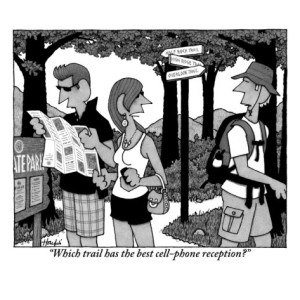 My suspicions about and criticisms of technology are certainly not new. Many people were frightened or appalled by early steam engines, of electric light bulbs, automobiles, and radios. Each stage of our love affair with technology seems to separate us a bit further from nature. As the Earth’s un-synthetic wonders shrink little by little in man’s preoccupation with ever increasing speed and what he sees as convenience, even at the cost of any future environment in which we will all have to live. Our infatuation in accelerating production and consumption has even invaded our food in a blind or greedy effort to amplify amounts while sacrificing nutrition. Profit has too often taken precedence over health benefits and caution for the future of our planet (the only one we have).
My suspicions about and criticisms of technology are certainly not new. Many people were frightened or appalled by early steam engines, of electric light bulbs, automobiles, and radios. Each stage of our love affair with technology seems to separate us a bit further from nature. As the Earth’s un-synthetic wonders shrink little by little in man’s preoccupation with ever increasing speed and what he sees as convenience, even at the cost of any future environment in which we will all have to live. Our infatuation in accelerating production and consumption has even invaded our food in a blind or greedy effort to amplify amounts while sacrificing nutrition. Profit has too often taken precedence over health benefits and caution for the future of our planet (the only one we have).
I sometimes wonder what the world will be like (if it still exists) millennia from now. Sensitive and intelligent science fiction writers, like H.G Wells, Aldous Huxley, Robert Heinlein, Arthur C. Clarke, Isaac Asimov, Ray Bradbury, and William Gibson, have conjured images of a desensitized planet of humans, who have become androids. Such things are not difficult now to imagine in a time when we see how cellphones and laptops disconnect many families, even at mealtime, and how so many individuals, present at accidents involving human injury, prioritize using their cellphones to take “selfies” instead of helping the victims, even by calling for help immediately. Such scenes make me afraid about what we as a species may become by even just a thousand years from now.
I wonder if technology is doing anything for our levels of patience, tolerance, or compassion, especially since that technology bombards us with images of suffering all over the world so that we shut down after a while and become jaded or immune to the pain of others. How much more like cyborgs will we have become, and is there anything we can or should be doing now to ensure that we don’t continue our journey as a species that becomes increasingly more insensitive in our continuing deification of electronic devices for personal pleasure and convenience?
What are we leaving out that might provide a balance between ease and efficiency for individuals and a more collective awareness for the common good? I’m not sure the answers can be found on Google or on my cellphone, where even texting has become the newest and most omnipresent form of public rudeness to which we are becoming frighteningly accustomed in a world where taking a momentous “selfie” is, for many, more important than saving someone else’s life. If such fears make me a human anachronism, then so bit. I’ve a strong feeling that I’m not really alone in my apprehensions about where our species could be headed if we’re not more vigilant JB

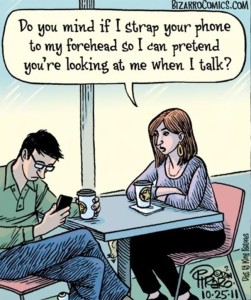
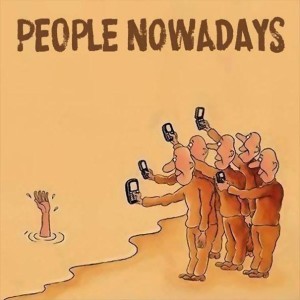
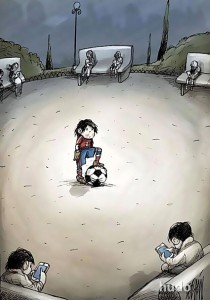
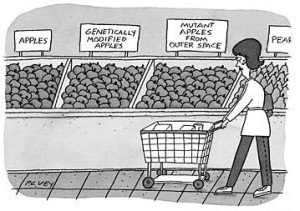
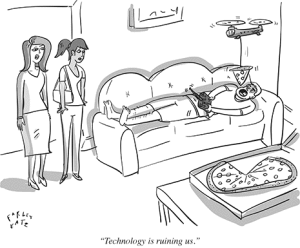
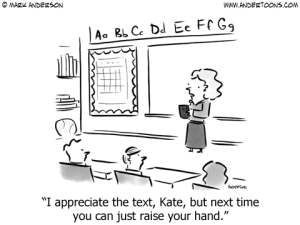
As the family genealogist, I was entrusted with a batch of letters between my great-grandmother and a favorite cousin of hers. My Great-Grandmother was married, had three children, and in her mid-life, was moved from Wisconsin to the Everglades of Florida – full of snakes and alligators and none of the ladies clubs and conveniences to which she had become accustomed in the mid-1920’s of fairly civilized upper Wisconsin.
Her cousin was unmarried, but had moved to Kansas City, Missouri and become a secretary to a well to do lawyer,. Their letters, exchanged over some forty years, were full of news about family and friends and events from the long gone past.
I can only imagine the trips each of them took to the mailbox every day, awaiting the news from someone they knew, but who was separated by great distance. Today, we are connected by instant messaging or texting, or even the archaic old style telephone call. In the 1930’s and 1940’s, people went to the mailbox and hoped there was a newsy letter from someone in a distant place. Phone calls were possible, but expensive, and many didn’t have the old, heavy rotary dial telephones, nor could they afford the expense of a call.
Telegrams were also possible, but were also expensive, and used only to convey news of the utmost importance. A birth, a death., a marriage. Routine news was relegated to the handwritten letter, posted to the mailbox, and often taking days or weeks to deliver.
Todays technology of instant gratification has done much to advance our world, but at what cost ? People are now so impatient that they break out their phones to diddle away a moment of otherwise unoccupied time instead of thinking about anything that should be thought about, or instead of appreciating the great beauty of whatever surrounds them.
We move ahead, that is our destiny, but what are we leaving behind?